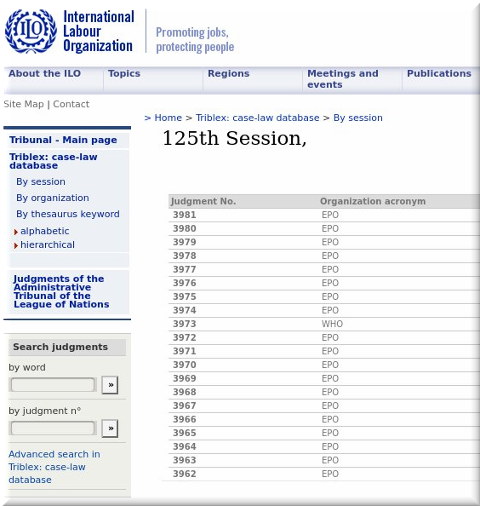

PRESIDENT Battistelli will leave the EPO in 5 months, but the damage he has done is truly incredible. His actions not only damaged patents but also staff; it's no wonder the EPO now suffers brain drain and is unable to recruit the type of people it used to. The EPO may never recover from this. Some insiders even wonder aloud if there's a future for the EPO at all.
"Over the past few months we have been attempting to show to ILO material about the EPO refusing to obey ILOAT rulings. Guy Ryder too was copied in."It is hardly surprising that, based on a JUVE survey, Battistelli has a 0% approval rate not only among EPO staff but also among EPO users (that's what they call stakeholders such as applicants). A lot of money is being invested in this (for small businesses it can be the lion's share of their budget).
Over the past few months we have been attempting to show to ILO material about the EPO refusing to obey ILOAT rulings. Guy Ryder too was copied in.
Does ILO realise that its reputation too is on the line? For failing to properly remediate?
"Our understanding is that some of these rulings were about EPO staff representatives."Yesterday was the 125th session of ILOAT and the decisions were not uploaded/published until late in the day. There is no video of this latest session, either (at least not yet, it would be listed here if/once it's ready).
Our understanding is that some of these rulings were about EPO staff representatives. The appellants typically request anonymity and are thus reduced to initials. We kindly ask if anyone with contacts at the EPO can help explain to us what happened at ILO yesterday afternoon. We need to properly know the cases in order to comment on them (few decisions we took a glimpse at were dismissals of appeal) because sometimes a negative decision or deferral is actually a positive thing, as we saw 2 years ago.
"We can expect that with the declining quality of patent examination (inevitable under Battistelli for several reasons) it may become a growing concern and will result in many decisions being overturned (or patents invalidated)."It would not be the first time we say that if EPO management cannot properly deal with justice for its own staff, it won't be able to assure justice for users. 8 days ago the CRISPR industry [sic] suffered a major blow after it had been promised -- in vain -- that CRISPR patents would be considered patent-eligible. There's a long discussion about the technical aspects of the refusal over at IP Kat. "I must also say that I love how US practitioners often think that everybody but them misunderstands the Paris Convention. That often gets a few laughs in proceedings before the EPO," wrote one person yesterday.
More on patent justice w.r.t. the Paris Convention:
More thoughts. Deep inside the USA, it is not just First to File and the importance of the Paris Convention that is less than fully understood.
Investors in the USA suppose that litigation is a lottery but that their man will win provided that i) his pocket is deep enough and ii) the jury does not come to the idea that he is a Bad Guy. Quality at the patent drafting stage is seen as a secondary matter, less "sophisticated" than litigation, less valuable.
Further, Americans always suppose that nothing is decided till everything is decided, namely at trial (ie Oral Proceedings).
Yet further, Americans always suppose that once a patent issues, its validity is, in practice, unassailable.
As to the pace of the proceedings on this European patent thus far, note that the B1 issued just 9 months after EPO national phase entry.
More haste, less speed?
In this case the patentee was unable to demonstrate that at the filing date of EP2771468 the named applicants were the true successors in title to all of the applicants of the 12 earlier US patent applications. One of the problems raised was that an inventor/applicant (Luciano Marrafini) named on some of the earlier US applications was not named as an applicant and nor was the institute he worked for (Rockefeller University). It is interesting to note that in the US the Broad Institute and the Rockefeller University were wrangling over whether this person should or should not be named as an inventor. A further problem raised with the priority claim was that some of the inventors had only assigned their rights to applicants named on filing EP2771468 after its filing date.